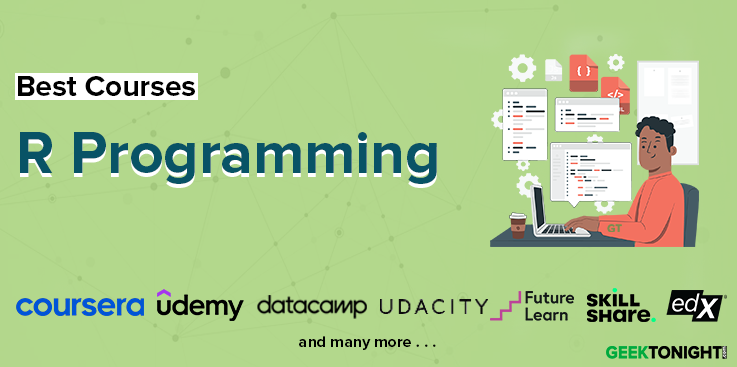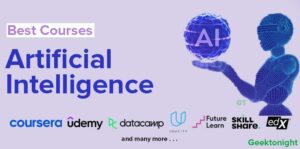The most popular programming language by data scientists and data analysts other than Python is R. As per the TOBI index, R has ranked among the top 6 languages in 2024 for beginners. It is commonly used for tackling both unstructured and structured data. It is also popular as a specially designed free software for statisticians to analyze data. It is not only open-source but also cross-platform. Learning R offers a statistical computing environment to visualize patterns in data sets and take data-driven business decisions.
If you are not aware of what R is and how it is changing the world, check out the list of Best R Courses Online to upgrade your career growth.
As a beginner, there are several reasons to learn the R programming language that can be found in the next section.

Why is it important to learn R Programming?
Today, R is trusted by some of the industry’s biggest names such as Google, Facebook, HP, Airbnb, HSBC, and more. R is a free programming language that can be installed for free and also easily updated, modified, and cloned.
As of May 01, 2023, the average salary for an R Programmer is $85,586 on Salary.com Salary ranges typically range from $75,613 to $96,660. There are a number of factors that can influence your salary range, including your education, certifications, additional skills, and how long you have worked in your field.
In addition to being easy to use, R is often in demand in business, which means that its practitioners can earn higher salaries. As one of the most powerful languages to assist in statistical programming and analysis of data sets, R programming is a promising skill to advance your career.
Check out these Best R Programming Courses and Certifications to find a suitable one for you.
Table of Content
- 1 Best R Programming Courses, Certification, Tutorials, Training, Classes Online
- 1.1 R Programming Certification by Johns Hopkins University [Coursera]
- 1.2 Programming for Data Science with R Nanodegree Certification [Udacity]
- 1.3 Software Development in R Certification by Johns Hopkins University [Coursera]
- 1.4 Statistics with R Certification by Duke University [Coursera]
- 1.5 Data Science: R Basics Certificate by Harvard University [edX]
- 1.6 R Programming A-Z™: R For Data Science With Real Exercises! [Udemy]
- 1.7 Data Science and Machine Learning Bootcamp with R [Udemy]
- 1.8 R Programming: Advanced Analytics In R For Data Science [Udemy]
- 2 FAQ
Our product recommendations are unbiased and based on an independent review process. We may receive a commission for links to recommended partners. See our advertiser disclosure for more information.
Best R Programming Courses, Certification, Tutorials, Training, Classes Online
- Best Overall R Programming Certification by Johns Hopkins University [Coursera]
- Best Runner-up Programming for Data Science with R Nanodegree Certification [Udacity]
- Best for Software Developer Software Development in R Certification by Johns Hopkins University [Coursera]
- Best for Statistics Statistics with R Certification by Duke University [Coursera]
- Best for Data Science Data Science: R Basics Certificate by Harvard University [edX]
- Best Budget Option R Programming A-Z™: R For Data Science With Real Exercises! [Udemy]
R Programming Certification by Johns Hopkins University [Coursera]
Coursera R Programming Course provides a platform to learn writing R programs. It will teach you an approach to use R for data analysis. You will know how to install and configure the software necessary for a statistical programming environment. This R Programming Certification will cover practical issues in statistical computing, including programming/ reading data, accessing R packages, writing codes, and debugging them.
Course Instructor
Roger D.Peng, Jeff Leek, and Brian Caffo are the instructor and creators of this R Professional Certificate for students to specialize in R language and enhance the power of programming. There are other two courses included in this specialization which you can opt for after completing this one.
What You’ll Learn
This Coursera R Programming Language Online is divided into 4 courses, which are
- Getting Started with R: This module will cover the installation of R studio, the history of R and functions for reading and writing R programs.
- Programming with R: This module covers key concepts such as control structures and functions. You will get the first programming assignment at the end of the week.
- Loop Functions and Debugging: The lectures will discuss loop functions and debugging tools in R. You will understand how R language is useful for interactive work and writing longer code.
- Simulation and Profiling: This module will teach you how to simulate data in R and run R functions. You will learn about profilers, a key tool for optimizing R programs.
Pros & Cons
Pros
- Useful and interactive coding sessions
- Certificate on Completion
- Financial Aid Available
Cons
- Very challenging
- Familiarity with regression models
Key Highlights & USPs
- Get acquainted with the basics of R programming and learn how to read and write data in R.
- Able to write your first program and understand the syntax
- Build knowledge of how to use loops and functions in programs, simulation and profiling in R.
- Learn how to analyze statistical data with real-life examples.
- Get free access to 18 readings, 55 videos, and 21 quizzes for improving your critical programming skill.
Who is it for?
This R Programming Certification Course is for those with programming skills and who understand regression. It is an intermediate-level course that helps you with the steep learning curve associated with R programming. As a result of completing this course, you will be proficient in R and will receive a certificate from Coursera for completing the course.
Rating: 4.5/5
Students Enrolled: 634, 195
Duration: 57 hours
Programming for Data Science with R Nanodegree Certification [Udacity]
Want to learn R for Data Science? Take a look at this R Nanodegree Certification from Udacity. You can prepare yourself for a data science career by learning the programming tools like R, SQL, command line, and Git. It will help you develop a lucrative career and find a job in the high-tech market. With this R Nanodegree Program, you get to work on real-world projects and data handling challenges.
Course Instructor
This R for Data Science Course is professionally designed by experienced data scientists and command line instructors. You will be able to learn everything with proper technical mentor support. This Certification Program will improve your performance and keep you on track.
What You’ll Learn
This Udacity R Online Certification Program includes three courses to help students acquire skills such as Git, Control Flow in R, SQL queries, and more.
- Introduction to SQL: This course covers SQL fundamentals such as Joins, Aggregations, and Subqueries. You will learn how to use SQL to solve complex business problems.
- Basic R Programming: This course will discuss the fundamentals of the R programming language, including data structures, variables, loops, and functions.
- Introduction to Version Control: In this course, you will build a strong foundation on how to use version control and build your portfolio to share with others in the data science industry.
Pros & Cons
Pros
- Get projects to test your knowledge
- Best instructors from Udacity
- Certificate on Completion
Cons
- Basic computer skills require
Key Highlights & USPs
- Learn fundamentals of SQL such as JOINS, Aggregations, and subqueries.
- How to use SQL for solving complex business problems.
- Understand R programming basics such as data structures, variables, loops, and functions.
- Able to visualize the data using library gg plot 2.
- Use version control and share your work in the data science industry.
- Provide unlimited access to practical tips, quizzes, and three projects to get the best practical experience.
Who is it for?
This Udacity Programming for Data Science with R Nanodegree Program is for beginners who are curious to learn basic R programming and other skills. By the end of this R Programming Nanodegree Program, you will be skilled at using R, SQL, Command Line, and Git tools to create data-driven solutions for a variety of tasks. Also, you can easily collaborate and share your work with others.
Rating: 4.4/5
Duration: 3 months, 10 hrs/week
Software Development in R Certification by Johns Hopkins University [Coursera]
This R Specialization with Certification offers you a platform to build R software development skills and use it for data science tools. You will get rigorous training in the R language for handling complex data and developing custom data visualizations. It builds the foundational knowledge of using R libraries for data manipulation and constructs tools for data scientists or developers.
Course Instructor
Roger D.Peng and Brooke Anderson are the creators of this Coursera R Course from John Hopkins University. This program is for data analysts to gain a firm grasp on software development skills and data scientists able to scale their programming knowledge.
What You’ll Learn
This Software Development in R Certification Program is divided into 5 Courses to master the skills thoroughly and design tools for data visualization.
- The R Programming Environment: This course will give an overview of R programming language and explain basic concepts of R such as tidy data, manipulating and processing of complex datasets, and other basic data science tasks.
- Advance Programming: In this course, you will learn about advanced R programming for building powerful data science tools. It covers key programming concepts such as object oriented programming, profiling, benchmarking, and robust error handling.
- Building R Packages: This course is all about teaching how to write R code for data science. This R course covers creating R packages, building reliable software, developing cross-platform, use continuous integration technologies, and distributing packages through CRAN and GitHub.
- Building Data Visualization Tools: You will learn the abilities needed to develop those brand-new visualization building blocks.
- Mastering Software Development in R Capstone: The last course is all about building your own software to manipulate complex datasets and build custom graphics.
Pros & Cons
Pros
- Includes a hands-on project
- Certificate on Completion
Cons
- Working knowledge of mathematics including algebra
Key Highlights & USPs
- Learn basic R concepts to clean, process, and manipulate complex data sets.
- Understand advanced R programming for developing robust, reusable, and powerful data science tools.
- Enable to define new data types in R and execute complicated data science tasks.
- Able to write R codes for building cross-platform software, continuous integration tools, and distributing packages via CRAN & GitHub.
- Describe how to use ggplot2 for creating data visualization.
- Get to work on the Capstone Project and manage the real-world case studies.
Who is it for?
Data Analysts, Data Scientists, and Developers are eligible to enroll in one of the software development in R. Some programming experience and knowledge of algebra are necessary for taking this R training program.
Rating: 4.2/5
Students Enrolled: 19,392
Duration: 6 months, 4 hours/week
Statistics with R Certification by Duke University [Coursera]
Master R with this Certification Program from Duke University. You will learn how to analyze and visualize data in R. It will demonstrate statistical inference, data modeling, and Bayesian approaches to make data-based decisions. You understand how to communicate statistical results without relying on statistical jargon. This complete R Course for Data Analysis will elaborate how to wrangle the data using R packages.
Course Instructor
These Statistics with R Specialization Courses are combined to teach Statistical Science. Professional instructors like Mine Cetinkaya, David Banks, Colin Rundel, and Merlise A Clyde created this program to train you for the field of Statistics and R programming. It consists of 5 courses to improve your skills. That will further get your job opportunities and introduce you to the world of Data Science and Machine Learning.
What You’ll Learn
This Coursera Data Analysis with R Specialization is divided into 3 courses to master R programming language for data analysis.
- Introduction to Probability and Data with R: This course will begin with sampling and exploring data and teach you basic probability theory and Bayes’ rules.
- Inferential Statistics: In this course, you will study statistical inference methods for numerical and categorical data. This course will help you with performing hypothesis tests, interpreting p-values, and reporting the results of your analysis.
- Linear Regression and Modeling: This course covers numerous linear regression models. With these models, you can evaluate the connection between several data set variables and a continuous response variable.
Pros & Cons
Pros
- Reading and Practice Quizzes
- Grading assignments with peer feedback
- Certificate on Completion
Cons
- Paid Certificate
Key Highlights & USPs
- Introduce you to basic probability theory and exploratory data analysis.
- Learn to install R studio and use it for lab projects.
- Get practical tools for performing data analysis and explore the fundamental concepts for interpreting numerical data.
- Understand how linear regression models work.
- Discover Bayesian statistics for transforming prior probabilities into posterior probabilities.
- Get the capstone project to analyze data using R methods and answer specific business questions.
Who is it for?
The online R course is for those who have a genuine interest in pursuing data analysis. You should know statistics and R programming. After completing, you will get recognition as a R programmer in the form of a certificate from Coursera. If you are new to data analysis, discover the list of best data analysis courses prepared by experts.
Rating: 4.6/5
Students Enrolled: 111,111
Duration: 7 months, 3 hours/week
Data Science: R Basics Certificate by Harvard University [edX]
edX provides a complete specialization program in Data Science. This Data Science with R Basics Course is the first part of the professional certificate program in Data Science. It will introduce you to the key concepts of R programming. You get trained in R to tackle problems using real-world data sets. It gives a must-learn opportunity to add R skill to answer essential questions.
Course Instructor
Rafael Irizarry is the instructor and creator of this Harvard Data Science Course using R. It is designed to enable learners for more in-depth courses and prepare to apply R programming for wrangling, analyzing, and visualizing the data.
Pros & Cons
Pros
- No Prerequisites
- Certificate on Completion
Cons
- Access allow to limited countries
Key Highlights & USPs
- Learn foundational programming concepts such as data types, vector arithmetic, and indexing.
- Understand R concepts including, probability inference, regression, and machine learning.
- Develop skill sets such as R programming, data wrangling with dplyr, data visualization with ggplot2, and so on.
- Build a strong foundation of working with R studio and performing analysis.
- Perform operations like sorting, analyzing, and visualizing the data using plots.
- Sharpen the acquired knowledge by clearing the graded assignments and passing the exams.
Who is it for?
If you are eager to become a data scientist, this R for Data Science Course is suitable for you. Having familiarity with data science and programming would be beneficial. It is an introductory-level course that anyone can enroll in for free. You will be a verified R programmer with a certificate upon completion. You can take the best data science courses to dive into this exciting field.
Rating: 4.5/5
Students Enrolled: 679, 151
Duration: 8 weeks, 2 hours/week
R Programming A-Z™: R For Data Science With Real Exercises! [Udemy]
Are you overwhelmed with the R programming language? Udemy brings you a step-by-step R Programming tutorial. So you can get a grasp on every concept of R and learn thoroughly without missing anything. It will teach how to use R for data science, data analytics, and statistical analysis. This R Programming Course is full of packages, functions, and GGPlot2.
Course Instructor
Kirill Eremenko, a Data Scientist, will help you with this R Programming A-Z Course. He has years of experience in the Data Science field and professionally guides the students. The Ligency Team and Kirill created the training program to train for real-life analytical challenges
Pros & Cons
Pros
- Interactive and practical examples
- Great-quality and well-structured curriculum
- Certificate on Completion
Cons
- Prior knowledge about basic statistics
Key Highlights & USPs
- This R Programming Udemy Course includes 8 sections to teach the core principles of R.
- Installing R Studio
- Core Programming Principles
- Fundamentals of R
- Matrices
- Data Frames
- Advanced Visualization with GGPlot2
- Homework
- Bonus Chapter
- Learn the core principles of R and how to write programs.
- Understand how to use functions, loops, and variables in R Source Codes.
- How to use and customize R studio as per your preferences.
- How to install packages and create vectors in R.
- Enough exercises to practice collecting the financial, statistical, and sports data using R.
- Get full lifetime access to 10.5 hours of on-demand video and six articles to improve the core knowledge.
Who is it for?
This R programming course is suitable for those who have the willingness to study complicated R courses. Having a prior degree in R is not mandatory. With successful completion, you will be able to apply R programming for data science and work on real-world applications.
Rating: 4.6/5
Students Enrolled: 218,478
Duration: 11 hours
Data Science and Machine Learning Bootcamp with R [Udemy]
This Data Science with R Course offers you an opportunity to learn R fundamentals and write code from scratch. You will understand how to create data visualizations and use machine learning using R. You can advance your knowledge by learning about R features, data frames, data visualization, and SQL. Able to launch your career as an R programmer or data scientist.
Course Instructor
Jose Portilla is the creator and instructor of this best R programming course on Udemy. It will start with absolute basics and take all the way to teach advanced concepts like data structures and machine learning models using R. You get the chance to work on exercises and projects to test your acquired knowledge.
Pros & Cons
Pros
- Very well-designed by instructor
- Great bootcamp to understand data science and machine learning
- Certificate on Completion
Cons
- Not enough exercises and projects
Key Highlights & USPs
- This Udemy Data Science with R Course comprises 35 sections and provides access to 128 video lectures to become proficient in R.
- Learn to write your first program in R programming and create interactive data visualizations and visualize the data using ggplot2.
- How to use R to handle excel files and for web scraping to extract information.
- Learn to use R for data analysis and data science.
- Able to write machine learning algorithms using R.
- Get over 100 HD video lectures and detailed code notebooks.
- Full lifetime access to 17 hours of on-demand video, three downloadable resources, and nine articles.
Who is it for?
Anyone can take this learning R programming with Data Science and ML Course for beginners. You only have to be interested in becoming a data scientist. Also, By finishing this course with dedication and consistency, you will earn skills to start your career as an R programmer. If you are interested in learning data science before enrolling, check the compiled list of best data science courses online.
Rating: 4.7/5
Students Enrolled: 75,123
Duration: 18 hours
R Programming: Advanced Analytics In R For Data Science [Udemy]
R programming is the most popular language for handling statistical data. With this R Course Udemy, you can truly become a pro in data science and analytics with R. It will help you take programming skills to the next level. This advanced analytic Course is divided into three sections to tell you how R is used widely by various industries for data analysis. You will get a better overview of how to handle data-driven tasks.
Course Instructor
Kirill Eremenko and the Ligency Team have created this Advanced R Programming Course. At the end of every module, you will strengthen theoretical and practical knowledge to lead a data science career. You will get real-life case studies, professional video training, and engaging exercises to give a taste of Analytics.
Pros & Cons
Pros
- Easy way to advanced topics
- Lots of interesting and fun activities
- Certificate on Completion
Cons
- Require explanation and exercises on some topics
Key Highlights & USPs
- This Advance R Programming Courses on Udemy comprises 5 sections, namely:
- Introduction
- Data Preparation
- Lists in R
- Apply Functions
- A Bonus Chapter
- Know how to perform data preparation in R and locate missing data in data frames.
- Know how to apply the factual analysis method and reset the data frame index.
- Learn to work with the financial data, clean it up, and prepare it for analysis.
- Create charts showing revenues, expenses, and profits for industries.
- Understand how coal machines underutilize by preparing data analysis tasks.
- Discover R programming methods used by the meteorology bureau for understanding weather patterns.
- Provide unlimited access to 6 hours of on-demand video and five articles to boost your confidence.
Who is it for?
Any Professional or programmer can apply for this advanced analytics in R for data science with basic knowledge. By completing all topics, you will enhance your knowledge and acquire a set of skills to build a successful data science career.
Rating: 4.6/5
Students Enrolled: 52, 803
Duration: 6 hours
Final Words
In conclusion, it’s a good language for you if you aim to become a professional data scientist. There’s nothing to lose to study R fundamentals online under the guidance of instructors. I hope you find a course to build the required skills to impress prospective employers.
FAQ
Is it easy to learn R?
R is open-source software and an easy programming language for beginners to learn. It is not mandatory to have coding knowledge to understand R. Nowadays, R is easier to understand and grasp than ever, only because of the Tidyverse collection of packages.
Can I learn R on my own?
Yes, It is possible to learn. R is a rich language and integrated software for statistical computing, graphical techniques, and data manipulation. There are hundreds of free online courses available to start your journey in R.
Coursera, Udemy, and Edx are the most famous ones where you can enroll for free, learn at your own pace, practice, and get a completion certificate.
Should I learn R or Python first?
Data Scientists widely use R programming for handling data analysis and statistics. While Python is the favorite programming language for Programmers and Developers as it compiles quickly.
R is not easy to learn as compared to Python. Python is the most suitable language for beginners as it requires less time to write. But once you understand the fundamentals of R programming, it can be easy to maintain the skills you’ve acquired.
How long does it take to become an R programmer?
It takes three weeks to learn R programming for beginners. You will learn basic concepts like creating, appending, subset datasets, lists, join. In the third week, you will understand how to apply functions, data analysis, and use the ggplot2 package to make visualizations.














